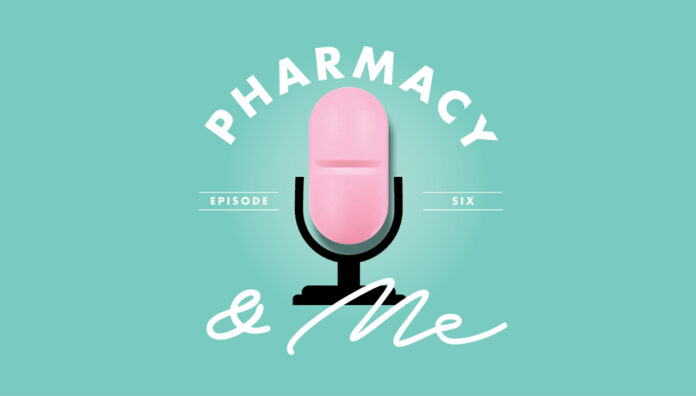It’s something every pharmacist experiences – the exciting, slightly terrifying transition from pharmacy student to intern and then again from intern to registered pharmacist.
How did you prepare for those transitions? What do you wish you had known before they happened? And what advice would you give to students and interns who are about to face the same thing?
In this episode of Pharmacy & Me, PSA’s NSW Intern of the Year Bridgette Mackley and hosts Peter Guthrey and Hannah Knowles answer some of these questions. Plus, Bridgette shares how she handled the pressures of intern year, her best advice for pharmacy students and interns, and how buying a toothbrush holder changed the course of her career.
Listen to the episode below or find it on Spotify, Apple Podcasts and Google Podcasts.
Pharmacy & Me is proudly produced by the Pharmaceutical Society of Australia.
‘You’re an intern and you’re not really responsible for very much other than yourself. And then as soon as you get that registration, it’s as fast as the flick of a light.’
Bridgette Mackley MPS
Follow the timestamps to jump to the topics below:
- [00:02:38] Facing the pandemic as an intern
- [00:06:43] Taking charge of your own learning
- [00:09:00] From intern to registered pharmacist
- [00:12:28] A sliding doors moment
- [00:17:31] How to find a mentor
- [00:22:09] First year challenges
- [00:28:44] Top tips
Resources
- Mental Health First Aid training: www.psa.org.au/advocacy/working-for-our-profession/medicine-safety/medicine-safety-rural-and-remote-care/
- Communities of Speciality Interest: www.psa.org.au/csi/
- PSA’s Intern Training Program: www.psa.org.au/programs-interns/
- Bridgette Mackley’s Australian Pharmacist interview: www.australianpharmacist.com.au/variety-better-wages-key-early-career-pharmacist/
Bridgette [00:00:00] You’re not really responsible for very much other than yourself. And then as soon as you get that registration, it’s as fast as the flick of a light.
Hannah [00:00:16] Hello and welcome to Pharmacy & Me, the podcast that explores how pharmacists do the extraordinary things they do. I’m Hannah Knowles, a senior pharmacist at the Royal Brisbane and Women’s Hospital.
Peter [00:00:27] And I’m Peter Guthrey from PSA and a community pharmacist at a 24/7 pharmacy in Melbourne. Each episode, we speak to an everyday pharmacist doing outstanding work about the highs and the lows of their career, and we unpack what they’ve learnt and how you can put their experience into your practice.
Today, we’re discussing something every pharmacist has experienced, that exciting, slightly terrifying transition from student to intern and then again, from intern to registered pharmacist. We’ll get our excellent guest on in a second, but I want to ask you, Hannah, do you remember your first day on the job as an intern?
Hannah [00:01:04] Yes, Pete, I do. I started my internship at a hospital in Canberra called Calvary Public Hospital Bruce. I turned up not knowing anyone and was very nervous and so overcompensated and was very smiley and introduced myself around the place. And I got to the boss and I said, ‘Hello, I’m Hannah, I’m the new intern pharmacist’. And she smiled a bit weird at me and then she said, ‘Yes, Hannah, I know who you are, I hired you’. So, it was a good start to the year. And yes, I remember the nerves settling down pretty quickly after that.
Peter [00:01:36] And I bet it was all uphill from there, or downhill in a good or a bad way. And I remember my first day in my intern year was the induction day in a big, very big lecture theatre at the Wollongong Hospital with a whole bunch of other pharmacists and other health professionals on their first day into their hospital career. And that lecture theatre may be familiar to our guest today. Bridgette Mackley also completed her intern year at Wollongong Hospital 13 years later on than me and is now a community pharmacist in the stunningly beautiful Coffs Harbour on the New South Wales North Coast. She’s also the PSA’s New South Wales Intern of the Year. Welcome and thanks for coming on, Bridgette.
Bridgette [00:02:12] Thanks, Peter. Thanks, Hannah.
Peter [00:02:14] Bridgette to start off with, tell us a bit about yourself. Who are you and what do you do?
Bridgette [00:02:19] As mentioned, between 9:00 to 5:00, I work as a community pharmacist and I’m also studying for my HMR pharmacist accreditation. Other than that, when I’m not at work, you’ll just find me doing anything outside. Anything like sailing, scuba diving and being in my garden.
Hannah [00:02:38] And if we think back into you starting your intern year, an intern year can be intimidating enough, but you began yours in a hospital, and shortly after you were faced with the pandemic, what was that like?
Bridgette [00:02:51] From my experience, the pandemic the first time around didn’t have the same grip as what the Delta strain does now. I was very lucky that I felt, relating to COVID, the hospital, which I worked at, COVID was quite under control and at no point did I feel like I was unsafe or that it was out of control. We did have a couple of changes within the department relating to splitting of the team. So we had the pharmacists which would be coming into contact with COVID separated from all of the rest of the teams. This also meant, unfortunately, that we were separated from our preceptor. I was very lucky I was an intern, I had a fellow intern, Stephen. We had each other, which was really good support. And then later, as the changes became a little bit more permanent, our preceptor was changed to someone who would be able to have a little bit more contact with us. My exams were changed, which was a little bit annoying, but I didn’t really feel the fear of the community. I was quite surprised when I moved into community pharmacy, in a place that had no COVID, that was the first time where I really feared it at some point.
Peter [00:04:03] And everyone around Australia has had a very different experience with COVID in the pandemic, but the intern year being such a pivotal year, it’s one of those examples where you go into the year thinking it’s going to be one way, and it turns out to be a slightly different way. Can you give us an overview of what your intern year day-to-day looked like for you at Wollongong Hospital?
Bridgette [00:04:21] So myself and my fellow intern, our roles, in the morning would start with doing something like managing the imprest, the satellite imprest cupboard. So we’d manage that. We would have a bit of time in the dispensary in the mornings. In the afternoon, we would potentially have some ward time or some compounding time or dispensary time, whatever was required from us. As COVID did happen, some of the opportunities that would have been afforded to us as interns at the hospital were not available at that time. For example, some of the multi-disciplinary contact which we would have been able to have with, say, the cardiac rehabilitation unit and also the respiratory rehabilitation unit, where a pharmacist had previously been embedded within those units and the intern was actually able to do presentations to the patients in those fields. Unfortunately, because of COVID, we weren’t able to have that experience as those clinics were no longer running.
Hannah [00:05:18] So, Bridgette, you’ve mentioned quite a few changes, which I think has been universal across pharmacy, but particularly with your intern year, how did you cope with those changes and still meeting the demands of the intern training?
Bridgette [00:05:31] I was very lucky to have support, not just from my fellow intern and my preceptor, but I guess also there were some times where I really felt like everything was a little bit out of control and I was very unsure of things. And for that, I leant on my intern training provider to help give some support. There was a couple of times, time-wise, where I got caught out. For example, unfortunately, we found out in May that our written exam would not be going ahead. And I think we’re actually the first year that ended up doing the oral exam before the written exam. So that was something that was a little bit different. It really taught me more than anything that you really can’t leave things to the last minute, especially when it does come to working in a team. So, for example, I consider that I was in a team with my preceptor and that I can’t expect, if I need help from her, that she would just be available that day or that week. You really have to respect each other’s time. You need to plan to say okay, this thing is due in a month, I need to have it finished now to give my preceptor time to look at it, to give me feedback, for me to make the changes and then submit it when it’s due.
Peter [00:06:43] I was really struck a while ago in an article where you were featured for that PSA New South Wales ECP of the Year Award, and congratulations, that’s a really fantastic achievement. In the article, you said, ‘the experience taught me that you can still be a leader as an intern if you manage yourself – your workplace is not responsible for your education, you are’. Was that something, a philosophy, that you took into the year? Was that something that you had, like a lightbulb moment, or that just kind of happened? Because that’s fantastic insight for someone so early in their career.
Bridgette [00:07:13] It wasn’t something that I thought about before my intern year. My intern year was actually my first experience working in a really big pharmacy team like this. I previously worked at other community pharmacies where the intern was so closely connected to the preceptors and the other pharmacists which were working and spending 8 hours a metre or 2 metres away. That guidance and that leadership and that support was always there. In the hospital setting, when there were a lot of other changes happening and when it’s a really big team, you don’t really get to work as closely. Because you do work physically, as closely, to other pharmacists but those other pharmacists also have a lot of independent responsibility, which they can’t really share with other people. So their work is very fast-paced and they need to be focused on that. I think that there was certainly some time in my intern experience where I was feeling a bit poor me, maybe I felt like I wasn’t getting the support that I needed, but I was really lucky to get, I guess, you know, some guidance from my preceptor, some other colleagues at my work and also my intern training provider, that kind of told me, like, that’s not an excuse. You are responsible for this. If you can’t, if you don’t feel like you can do it within whatever timeframe, you need to kind of stop and think, what are you doing instead? Is it actually that important? What is your priority? I think that that was a real moment for me where I kind of had that mindset of being like, this is not just a rollercoaster that I’m going to hold on and get to the finish line, I actually have to, I really have to fight to get there. And I did.
Hannah [00:09:00] You did. And a big congratulations on making that one through. One of the things that really got me is when you said, what is your priority? And I feel like as pharmacists, we’re always needing to ask that question to ourselves and making sure that we’re delivering patient care. After the intern year, what was the transition like going from an intern into a registered pharmacist?
Bridgette [00:09:22] It was pretty fast. I shouldn’t have been surprised by that, but you’re an intern and it’s very cruisy. You’re not really responsible for very much other than yourself. And then as soon as you get that registration, it’s as fast as the flick of a light. All of a sudden, I guess there’s that kind of, I’m only just registered or it’s my first year being a pharmacist, doesn’t really count anymore. You’ve already had your internship and you need to be ready. The change was pretty abrupt for me. With that in mind, I guess that potentially if I could have done my internship year a little bit differently, I would have. Just to make sure that I was really, I guess, robustly confident. And I think that’s something that should really be a goal for interns to try to achieve that as much as possible. Doing that would be making sure that, for things like the guidelines relating to medications that you’re really comfortable with all of those things and also that you’re really comfortable with your own values, in that if something is not as per guideline, how are you going to deal with it?
Peter [00:10:38] You talked a bit about confidence and values there and this lightbulb moment where you flicked the switch on in one way from your career going to being all that lead up work and then you’ve got that moment where you do your first script. Do you remember what your first script was as an independent, autonomous pharmacist?
Bridgette [00:10:55] I was doing the renal prescriptions for the renal dialysis unit, so I was doing lots of S100 scripts and non-formulary items. So I can’t remember exactly what my first prescription checking was, but I remember I had a whole day of this pile, looking at, I guess, all these darbepoetin injections. And, you know, checking everyone’s HB and okay, is this still appropriate for the patient? And then having a couple of like non-formulary medicines that came through, you know, just making sure like, okay, am I confident that these have gone through all the right steps before they got to me? Have they been supplied to the patient before? Some of them had, some of them hadn’t. But yes, a bit of a whirlwind of just getting stuck in, summarising any questions that I had so I can make sure that I can get this job done, and then after I finish this job, anything that I’m not sure of going to check with someone.
Peter [00:11:55] Those non-formulary lines in the renal unit sound a little bit more complex than my 10 or 50 milligram community pharmacy script, which I was quite relieved was relatively straightforward as my first prescription. You spoke about that in your intern year, you’ve had some really intriguing and challenging experiences working through the pandemic in the hospital, and you’ve then done some of your first prescriptions working in that hospital setting. You’ve then made the transition into a community pharmacy role in Coffs Harbour, swapping one beach city for another beach city. How did you come to that decision to make that change?
Bridgette [00:12:28] The change came about after my partner and I were able to take advantage of an opportunity relating to a house in Coffs. So that had happened. And then I was in Coffs Harbour for a job interview, which was actually at Coffs Hospital. They had a Grade 1 role which was available, and so I was up visiting for that. I popped into a pharmacy, a community pharmacy across the road from the hospital to get a toothbrush holder. When I was in there, I ran into a colleague who I’d worked with when I was a pharmacy assistant in Sydney about 8 years ago. She asked how I was doing, what I was up to. When I mentioned that I was a pharmacist, she mentioned that there was a job which was going there and that they were really good employers, and did I want to have a chat with the manager? I had about an hour before my interview, so I thought, of course, yes, that sounds great, I’ll go in and have a little bit of chat. So I met the manager and we just had a really good conversation about how they were supporting the community. They’re quite a modern pharmacy using technology wherever it can be helpful for the pharmacist’s role, with things like robot packing machines, sachet checking robots and also things like dispensing robots. What really drew me was that the pharmacy had a very close relationship with a GP clinic and also the pharmacy was already set up in doing some outreach work with some of the local Aboriginal services here in Coffs. So, for myself, I have been keeping my eye on the role of the GP pharmacist ever since I heard about their role, which is maybe about 4 years ago or something like that. Coffs also has quite a population in which there’s interest in gender and transition therapies. I thought as a pharmacist, that would be something that I would really love to support that community. So for all of those reasons, I was more and more drawn to this job.
Peter [00:14:38] So you swapped a clinical role in the hospital for a clinical role in the pharmacy based off of the purchase of a toothbrush holder. Hannah, can you beat that for a job interview?
Hannah [00:14:44] I wish, it’s such a sliding doors moment.
Bridgette [00:14:48] Very much a sliding doors moment. I was very lucky.
Hannah [00:15:02] Bridgette, you’ve achieved so much in such a short time. Were you always a confident person that knew what you wanted?
Bridgette [00:15:08] No, not at all. Actually, when I first left school, I worked as a nanny and I did a tafe course in accounting and then I worked in a pub and then I worked as a pharmacy assistant during the daytime. I quite liked working as a pharmacy assistant. I had a really supportive team. This was in a community pharmacy. I worked there for about a year, did my S2/S3 training, I wanted to do my Certificate III, so I did that. After that, I worked in Newcastle. So after being there for a little while, I moved to Sydney, where I was so lucky again to get a job as a pharmacy assistant somewhere that was really supportive that actually paid for me to do my Certificate IV in Community Pharmacy. I was probably three quarters through that when I thought that I might like to study something that had a little bit more weight to it, so I started studying a Bachelor of Health Science, thinking that I would be a naturopath. And it wasn’t until I went back home to see my family, who is in Gunnedah, that I kind of realised that, if I ever wanted to move home, there would not be a job for me. So I guess with that in mind, I decided maybe I’ll just apply for pharmacy and see if I got in and I did, which I was pretty stoked about. I moved from Sydney to Newcastle to start doing the pharmacy study. At that point, I’d actually worked in pharmacy for about 6 years. I was really lucky to do that. It meant that I really hit the ground running with a pharmacy course. I didn’t find the first couple of years too challenging other than the chemistry and the mathematics. And just got into doing some things with PSA to really help me understand a little bit better the systems of pharmacy rather than just the front of pharmacy or the shop front of pharmacy. From there, I started finding all these other little interesting areas of pharmacy and got exposed to a lot of things from my work with the Early Career Pharmacists Working Group.
Hannah [00:17:31] So, Bridgette, you’ve mentioned a lot of people along your journey in pharmacy. How have you found having a mentor has helped you in your career?
Bridgette [00:17:36] I was lucky enough to be connected with a mentor early on. I was a recipient of a rural pharmacy scholarship, which as a part of that program, I had a formalised mentor. I found my mentor when I was actually at a PSA talk, which was called Having The Confidence To Say No and Rachel Dienaar was her.
Peter [00:17:55] Who is fabulous.
Bridgette [00:17:58] She is, isn’t she? So, yes, I totally had like a fangirl moment after the talk, just being like, I feel like I have a lot to learn from you, would you be interested in being my mentor? I think, following that, I have certainly, I think that certain pharmacists which I meet, which I come across, you know, particularly those which I did come across through the Early Career Pharmacists Working Group, I feel like I have a lot of confidence to ask that question like, do you mind if we keep in touch? Will you be my mentor? But it is important even actually, I have some former employers that I don’t hesitate just to get in contact and say, I’m having a bit of trouble with something, do you mind if I talk to you about it? And those years of experience are invaluable from people who have already trod the path which you are walking.
Hannah [00:18:56] Absolutely. And it sounds like you’re very good at collecting mentors. Have you got advice for other early career pharmacists on how to approach someone to ask them to be your mentor?
Bridgette [00:19:06] Number one is you need to actually know what’s out there. Pharmacy is not just hospital pharmacy, and it’s not just community pharmacy. There’s a very broad scope and you meet amazing people at conferences. So I feel like all of those kinds of things, when they’re available, whether online or otherwise, try to go to them. If you see someone who you think really has something about them that you admire or they are in a position which you would like to be in the future, just get in contact with them. For most people, you can find on LinkedIn, or if it is in person, just ask them, say, you know, my name’s Bridgette, I’m an early career pharmacist. I really like what you’re doing, would you mind if we keep in touch? I think that’s the first step. One thing that I do, that I feel like anyone who’s ever had a mentor will probably experience, at some point there can be some big gaps between your contacts. If it has been a little bit of time and you’re feeling out of touch and you don’t just want to be asking them for advice all the time, feel free to send an article to them or anything that you’re kind of reading, that you just want to do something to build a bridge and keep in contact. It’s a great way, a great way to do it and worth it. Totally worth the time and even momentary embarrassment thinking that they might say no.
Peter [00:20:30] And these are just some really great ways of some formal mentoring networks. But I’ve often found in my life, it’s the people who are social contacts who then become really quite dear friends as well. Bridgette, do you have friends that have become really close mentors to you, that maybe not have more years of experience but have a different practise perspective to you?
Bridgette [00:20:50] Definitely. I’m lucky enough that I am nearly coming up to my 10-year pharmacy anniversary.
Peter [00:20:55] Congratulations.
Bridgette [00:20:56] Throughout my pharmacy assistant to pharmacist industry experience. And I think that there are definitely things, one thing actually, a really good piece of advice that I got from a pharmacist in Wollongong, was just encouraging that when you are asking yourself those questions about challenging things or what your values are or what your principles are, should I do this activity or not, is to kind of keep in mind that you’re actually building your own career, you’re not building someone else’s. So you’ve got to consider that. But I think as well, like through work experience, keeping in contact with old bosses is a really great way to get another perspective.
Peter [00:21:37] So always leave on good terms.
Bridgette [00:21:39] Yes, where possible. But sometimes, even if you don’t leave on good terms, a couple of years later, that bridge, time has healed itself, you should get in contact. Whether you get in contact or not, it’s still a good idea to reflect on those experiences because if you like them, you can take away what you liked, and if you didn’t like them, you can think to yourself, I didn’t like X, Y and Z, and I’m not going to be like that as a pharmacist.
Peter [00:22:09] Bridgette, you spoke earlier about how going into community pharmacy was a completely new practice experience, and there’s a confidence that you wish you kind of had before you started. It’s also possibly reflecting that there’s always challenging experiences when you go into new workplaces. What are some of the really challenging things that you’ve dealt with since becoming a fully registered pharmacist?
Bridgette [00:22:28] Since working in the community field, the most challenging has been having patients come to you with things like COVID stress and saying, you know, I’m in my 80s now, I’ve only got a couple of months or years left in my life and COVID is ruining it. You don’t really know what you’re going to get hit with, you know, patient wise in the community pharmacy. I was really lucky that in my internship year, I did my Mental Health First Aid course. I did that through PSA, and that prepared me really well for engaging and opening up on those conversations and having a little bit of confidence in verbalising, I’m really worried about what you’ve said, are you feeling depressed? Certainly, for some patients, again, with COVID and a little bit more related to the Mental Health First Aid course.
We had a patient come in, they were using some quetiapine, quite a high dose, and I could see that they had self-harmed. I thought to myself, I don’t know the patient and I don’t know the situation and I had my doubts if it was actually going to be safe for me to supply the medicine. And so I guess the only thing that I could really do is talk to the patient and just say, okay, I noticed that you’re bearing some injuries, what happened? And she opened up to say, yes, she had been self-harming. She’d recently been discharged from a mental health ward, she’s a diabetic patient, she had some plans to overdose on insulin. Just a whole lot of really deep emotions, which I was just glad that I had the confidence enough to sit down, to have the conversation to ask, you know, how are you feeling now? Do you have support? Do you have a plan that if you’re not feeling like you have support, what are you going to do? And I ended up just saying, in my mind, this is a potentially high-risk medicine. You don’t live too far away, are you happy if I just give you a couple of days’ worth and you can come back? Does that suit you? And she was okay with that, which I was so pleased about, but I was so glad that I’d had that preparation and that kind of tools in my toolbelt to be like, okay, I’m going to have to use this.
Peter [00:24:52] The tools in the toolbelt is fantastic because there’s a couple of things in there that are really important. One is that when you ask direct questions, people do open up quite often and give you an opportunity to help, and that is quite a gift for someone that’s in a really stressful situation. And also, reflecting what can I do to make my impact on this person a positive one rather than a negative one and increased safety, and some really great tips in there.
Bridgette [00:25:15] And I guess as a community pharmacist, the thing that I love the most about community pharmacies is that it is so entrenched in your scope of practice to show care and compassion to patients. I love community pharmacy for that reason.
Hannah [00:25:27] Makes it really rewarding when you can have such an impact, Bridgette. What prompted you to do the Mental Health First Aid course?
Bridgette [00:25:36] I was interning in Wollongong and I did a little bit of helping another pharmacist do some collections, supplying some medicine to the bushfire affected areas, particularly around Tobago. So I thought that eventually, I’d probably drift down that way to help work as a pharmacist. So that was my motivation in doing it. And yes, it was actually hugely beneficial to my professional development. But I feel like also, I think that it prepared me amazingly for, I guess, the community fear that I would come across relating to COVID.
Hannah [00:26:17] Bridgette, earlier when we were talking, you mentioned about that step from intern to registered pharmacist being quite large and wishing that you had done things differently. Is there anything that you wish you had known before you became a registered pharmacist?
Bridgette [00:26:32] I wish a little bit that I’d been more prepared for the pressure. Especially in a community setting, when it does become your turn to be a registered pharmacist, it doesn’t matter if you had a year’s experience or more, to the other pharmacy staff, for example, like technicians and assistants, all of a sudden you’re the pharmacist and that you’re going to be making all of the decisions and that you’ll know what to do. I think that’s something that I probably didn’t wrap my head around before I was in that position.
Hannah [00:27:07] Yes and it can be very hard to get a concept of what pressure actually is until you’re actually in the situation where you’re the one making the final decision. Another change between students and interns is sort of the opportunity with support and to connect. So we find that as a student and then again as an intern, you have a lot of support and opportunities to connect with other pharmacy students, different programmes such as NAPSA, how are you continuing to do this now that you’re registered?
Bridgette [00:27:35] I find a lot more time to contact my mentors because all of those other support networks are not available. Also, in facets like the PSA Communities of Special Interest, is very helpful as well. And for those who don’t have a mentor, or feel like they need some more support or want to know where their career can take them, that’s a really great place to engage with people who have all different levels of experience.
Hannah [00:28:03] Yes. The CSI’s can develop a wealth of information, and some of the discussions are really fantastic. Bridgette, we like to end the episode with a couple of questions. So our first question for you is, what’s the best piece of advice you’ve been given that’s helped you in your career?
Bridgette [00:28:21] Always ask yourself what problem am I solving. When it comes to things like prioritising yourself or considering your values framework on things that are going to help you in making a decision, I ask myself that all the time. Often I find that it’s helpful in getting me kind of back on track and also working out where my energy should be spent.
Peter [00:28:44] That’s fantastic. And finally, what are your top three tips for the interns as they start to embark on their careers?
Bridgette [00:28:50] Number one would be to use all of your people resources that you have, so use your intern training provider, and use the pharmacists which are around you, use your preceptors, use your employers, to really help you understand as much as you can about pharmacy. Your intern year is designed to be a sponge year where you’re going to be so chockers full of knowledge. And they do say intern year is a marathon, not a sprint, but I have to say, don’t leave any stone unturned. Try to get as many experiences as you can to really help you decide what kind of pharmacist you want to be.
Peter [00:29:31] And certainly make the most of any job interviews that come from purchasing toothbrush holders. You never know when a sliding doors moment may take you to that next level. It’s been absolutely fantastic having you on the show today, Bridgette. Thank you for coming on and sharing what some of those really big transitions were like.
Bridgette [00:29:49] Thank you very much, Peter and Hannah. I really appreciate your time and I hope that this can help other people.
Hannah [00:29:54] You’re wonderful, Bridgette. And thank you to everyone for listening. Check out the show notes for links to everything we’ve spoken about today, including PSA’s Mental Health First Aid Course, the Communities of Special Interests.
Plus, don’t forget to subscribe to hear episodes as soon as they’re released. And if you’re a pharmacy student, PSA’s Intern Training Program will set you up for a smooth transition into practice.



 Pharmacists have always prescribed, but they have the potential to prescribe much more
Pharmacists have always prescribed, but they have the potential to prescribe much more



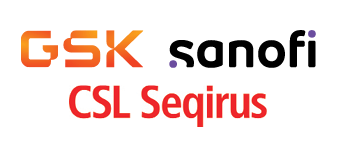 Sponsorship information
Sponsorship information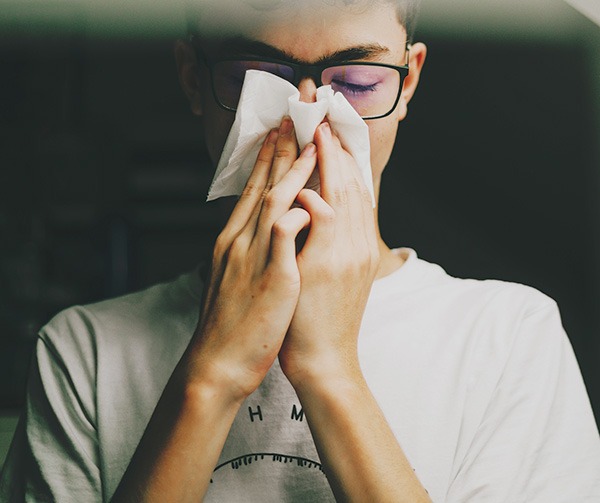
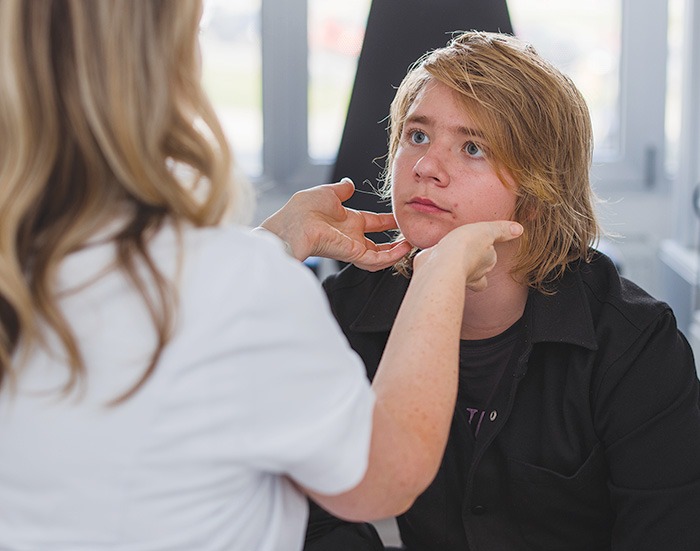
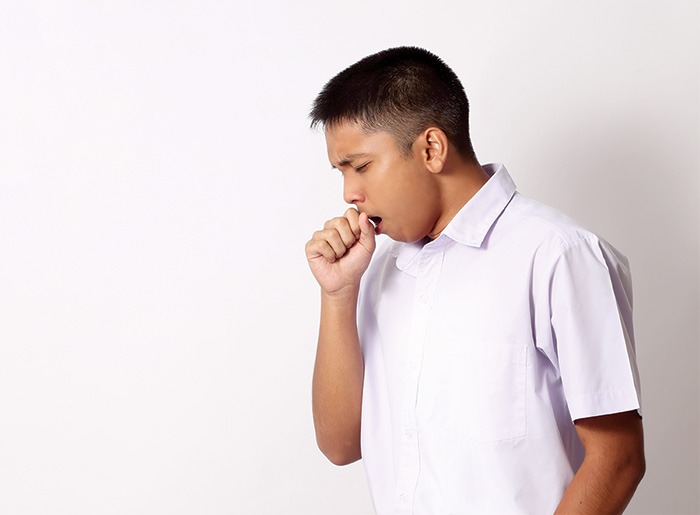
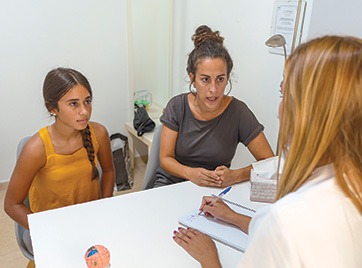 Talking to patients who have questions
Talking to patients who have questions